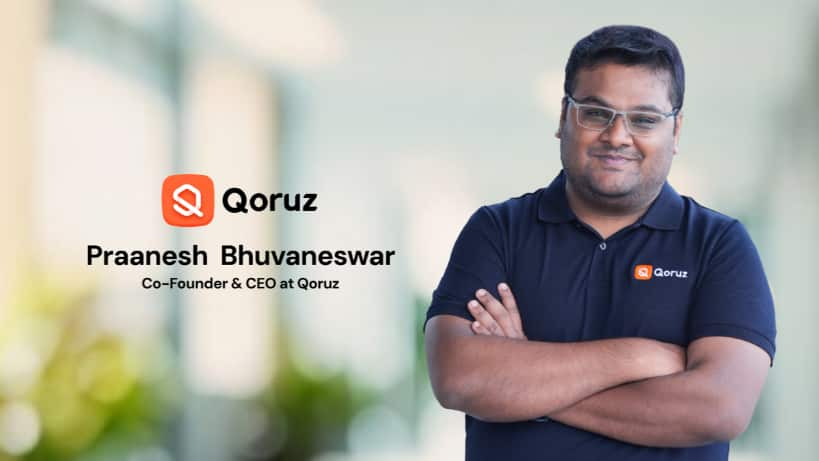In a conversation with BrandWagon Online, Praanesh Bhuvaneswar, Co-founder and CEO at Qoruz, shared how the team intentionally avoided vanity metrics and short-term growth hacks.

Praanesh Bhuvaneswar, Co-founder and CEO at Qoruz (Source: prhandout)
In a startup ecosystem where investor sentiment is shifting toward sustainability and substance, startups today are expected to show more than just rapid growth—they need real traction, efficient execution, and a path to profitability.
Qoruz, a platform operating in the creator economy space, recently secured fresh funding by doing just that: staying lean, doubling down on product relevance, and maintaining discipline in execution.
In a conversation with BrandWagon Online, Praanesh Bhuvaneswar, Co-founder and CEO at Qoruz, shared how the team intentionally avoided vanity metrics and short-term growth hacks. The team focused on solving a real problem and being capital efficient; this clarity helped them align with investors who valued long-term thinking.
Qoruz secured $500,000 in funding from The Chennai Angels as part of its ongoing pre-Series A round, which aims to raise a total of $1 million. (Edited Excerpts)
Our core belief has always been, “irrespective of external capital, keep building, stay efficient, and balance today’s operations with tomorrow’s innovation”.
We’ve held that line for years. Revenue grew without reliance on funding because the value delivered to partners was impactful across different stages of Qoruz. We built patiently while the market reorganised itself, and caught up.
What resonated with investors was the consistency in that approach. Not scaling with impulsive burn, but scaling with purpose. We kept developing products, iterating on market fitment and feedback, staying directionally right while others moved reactively. That discipline is what gave them conviction.
Every rupee we spend carries intent and thoughtful spending, shapes how we hire, how we go to market, and how we pace execution.
We aren’t rushing to expand because capital came in. The roles were already defined, the plans already tested, and we are continuing to build on the frameworks & pockets of innovation which we saw earlier successes. If earlier we waited six months to make a hire after validating a market by stretching our GTM teams, now we might do it in three; that would probably be the difference pre vs post the raise.
Be it product or marketing, every investment is tied to outcomes. Clarity for the customer, value for the ecosystem. That’s what responsibility looks like to me: being trusted with capital and using it like it’s your own.
For us, infrastructure means being dependable, not central. Our goal is to enable everyone who is a valued player of the ecosystem, not to own the end-to-end of it.
We work closely with agencies building their influencer verticals, with talent managers helping creators scale, and with brands that want more accountability in how they run campaigns. Today, 9 out of 10 of the biggest agencies in India use Qoruz to power their creator strategies, and many have built their own businesses on top of our platform. “Create tech and software touchpoints they can plug into and work synchronously to earn and deliver value across multiple stakeholders of the creator economy”, that’s the mission.
People are building real businesses, real revenue units and verticals on top of Qoruz infra, and that’s by design. That’s the lens we use: long-term alignment over short-term wins. So, when we say infrastructure, we mean the kind of backbone others can rely on to grow, not just us.
It starts with clarity of knowing and understanding who we’re building for, across teams. We focus on serious, high-value customers who treat this channel as core to their growth, and also spend less time chasing experimental budgets or short-term models that don’t scale.
Most of our internal resource allocations go into doubling down on what’s already working, with also intentional but tighter bets on what could matter five to eight years from now. That balance helps us stay grounded in value while still evolving.
Retention follows when you invest beyond the transaction. That trust compounds over time, and it shows up in the numbers.
The GCC market has its rhythm. While adoption might start more cautiously, once there's conviction, the pace of scaling is far more aggressive than what we typically see in India. For instance, an Indian brand might take a year or two to grow a creator budget from 10 to 50. In GCC, once the value is proven, they move from 10 to 100 in a single quarter. That kind of decisiveness and commitment to scale is impressive.
Indian brands are more iterative, which has its strengths, but there’s something to learn from GCC's speed once alignment is clear. They don’t wait around once they see it working.
We focus AI on solving real, high-impact problems, beyond minor and well-meaning optimisations.
One example: Marketing teams spend days trying to shortlist creators manually, especially on niche, high-value campaigns. Our AI ranks and suggests creators based on past performance, audience relevance, and even brand tone, turning a high-judgment, time-heavy task into a smart, data-backed shortlist in real time.
One major bet is to leverage Qoruz data with AI, to eliminate and reimagine months-long tasks like competitive benchmarking reports or landscape analysis, which brands typically pay big firms for, and make them fast and accessible.
Beyond tweaking workflows, we are rather doubling down on redefining workflows so brands and creators can work smarter, faster, and with more confidence, and that’s where AI delivers real value.
By continuing you agree to our Privacy Policy & Terms & Conditions
